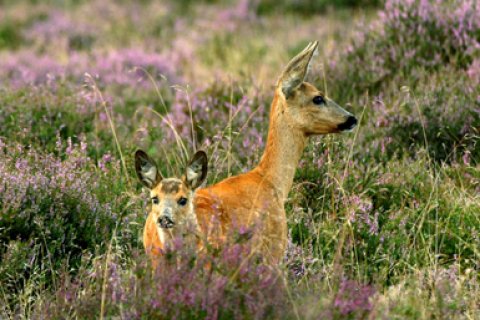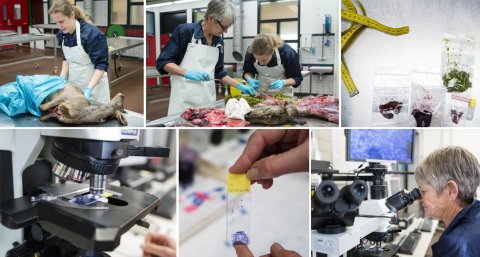Dutch Wildlife Health Centre

Surveillance of wildlife health
Health and welfare of wild and feral animals are important factors in population dynamics of wildlife and environmental management in the Netherlands. Many species of wild animals are present in both urban and rural areas. A better understanding and improved monitoring or surveillance of wildlife health is important for several reasons, including:
- Early recognition of emerging diseases
- Possible transmission of disease between humans and wildlife
- Possible of transmission of disease between domestic animals and wildlife
- Role of disease as indicator of environmental change
- Threats to wild animal welfare
- Threat of decline or extinction of wildlife species
Wildlife disease surveillance
The DWHC performs wildlife disease surveillance and diagnostic activities. The core activity is general wildlife disease surveillance. This explains the embedding in the Department of Pathobiology of the Faculty of Veterinary Medicine. We investigate around 500 unusual wildlife mortality incidents a year, through post-mortem examination of specimens submitted by the field. We collaborate with a large network of institutes for the additional diagnostic testing, and initiate further research on project-basis if necessary. Tissue-banking allows for retrospective studies.

We also contribute to targeted wildlife disease surveillance/monitoring in the Netherlands, including the dead wild bird monitoring for avian influenza. Achievements over the past years include the detection and further investigation of zoonotic and wildlife diseases previously considered absent from the Netherlands, such as tularemia, Usutu virus infection, ranavirus infection and tick-borne encephalitis.
Education and advice
We apply our expertise for wildlife health education and training. In addition, our team provides expert advice and reports on wildlife diseases to decision-makers and delivers comprehensive scientifically-based information to the public. Entrusted with a coordinating role, the DWHC can help orient organisations looking for possible partners for wildlife health activities in the Netherlands.
Located in Utrecht
The DWHC is located at the Department of Pathobiology of the Faculty of Veterinary Medicine in Utrecht. We receive financial support from the Dutch Ministry of Economic Affairs, the Dutch Ministry of Health, Welfare and Sports, and the Faculty. Representatives from Dutch institutions concerned with human or animal health and wildlife in the broadest sense form the DWHC scientific advice commission.
More information is available on the DWHC website (in Dutch).


